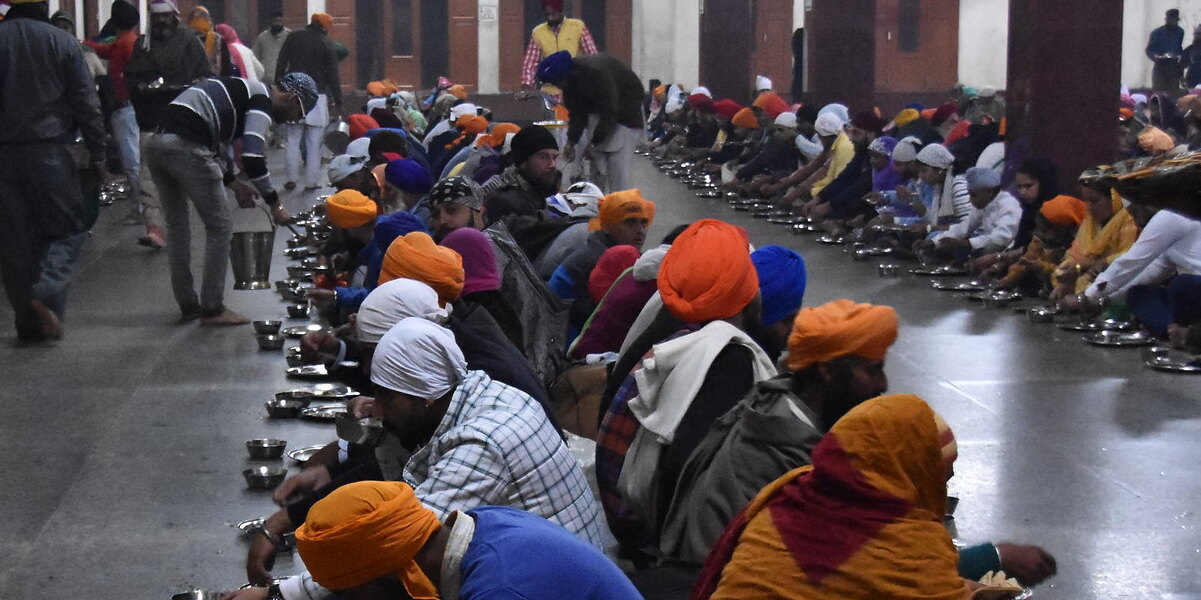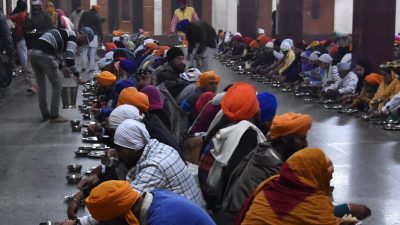
‘The cauldron, the sword, victory!’ is part two of three from a collection of essays on ‘social solidarity’ that were originally featured in issue #231,‘People, Power, Place’, published in March 2021. Read part one here.
Langar as Sikh praxis goes back to the earliest Sikh history, when Sri Guru Nanak Dev Ji set up a communal food provision for marginalised folk ostracised by a casteist society. Settlements founded by the Sikh gurus centred on a collectivist approach to community welfare that sought a harmonious relationship between people and nature, the laha (‘profit’) of this balance manifested as a deep-rooted Sikh desire to provide food for all, and the practices to make this possible.
Today, the Sikh praxis of langar is often summarised in GCSE textbooks as ‘free food at every Sikh temple’. Over the course of Covid-19, Sikh organisations and gurdware have been praised publicly for their role in tackling food insecurity. Unfortunately, the significance of langar has been reduced to passive free food provision as a result, belying its radical roots and potential.
Langar does not exist in a vacuum. One of the oldest Sikh sayings is ‘Degh, Tegh, Fateh’ – ‘the cauldron [commensality], the sword, victory!’ This points towards langar as the foundational Sikh revolutionary space: it is not a passive space where you come to observe and have a free meal. Whether it was in the 18th century, when Shaheed Bhai Taru Singh gave langar to Sikh jujharoos (fighters) and was scalped for it, or the 20th century, when Sikh families in Punjab served langar to Khalistani jujharoos only to become targets of state terror, langar has always gone hand in hand with Sikh revolution and Sikhs have willingly embraced its reality as active participants in the sangharsh (Sikh struggle for liberation).
Beyond palatable charity
Most recently, in the UK, langar has made headlines as gurdware and Sikh charities served thousands of hot meals to truck drivers stranded in Kent when the border with France was closed at Dover due to the new strain of Covid-19 detected last December. While charity has its merits, the language around this sort of Sikh-affiliated charity represents a gross reduction of what langar can and should be, all to render Sikhs more palatable as a model diaspora community to a white state.
Our role as Sikhs isn’t confined to fixing the broken people that capitalism churns out as a byproduct of its economic model. We’re not neo-colonialism’s personal clean-up crew. It has to go beyond ‘langar is the free meal service found in every gurdwara’, ‘hello langar, goodbye world hunger’ – these aren’t Sikh ideas, they’re marketing slogans. ‘Langar Week’ is a capitalist response to a problem created by capitalism – it represents the death of an idea by commodification; tackling the root cause of these problems is apparently beyond the permissible scope of Sikh existence, so here’s a bite-sized version that you can engage with at your leisure, one week a year.
A more radical perspective on langar is nowhere more evident than in the Kisaan Andolan (farmers’ movement) protests in ‘India’. [Some Sikhs contest the use of the word ‘India’ as a colonial, political construct.] Protesting the imposition of neoliberal reforms opening up India’s agricultural sector to further privatisation, a reported 250 million people went on strike in November, and since then tens of thousands of farmers have camped out on the highways into Delhi. They have survived on langar provided by each other, with farmers and labourers of different castes and religions eating side by side in the freezing winter.
As well as feeding themselves, Sikh farmers have extended langar to all those in need. This langar is the material solidarity that has enabled the protests to last months, with the protest site itself becoming a revolutionary space. As farmers face up to the brutality of India’s police, protesters and locals alike have had three meals a day to sustain them. On the frontlines of struggle today, langar is a site of solidarity, a vision for social justice that rejects casteism and a source of material and spiritual nourishment.
Shamsher Singh is an activist and co-founder of the National Sikh Youth Federation and programme director for the Khalistan Centre
This essay first appeared in issue #231 ‘People, Power, Place’. Subscribe today to get your copy and support fearless, independent media.











